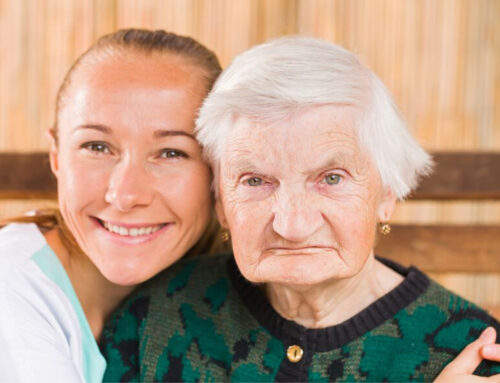One of the challenges of being a family caregiver to an older adult with dementia is ensuring they get enough nutrition. Proper nutrition is essential to keeping them in better health. However, as dementia progresses, many seniors simply forget to eat. They may also be on medications that have side effects like changing the taste of food or reducing appetite. When your aging relative does not eat well, it can lead to other challenging behaviors, such as irritability and sleeplessness.
If you’re struggling to get your family member with dementia to eat, here are 5 tips that may help.
#1: Stay on Schedule
Having a routine schedule helps with many dementia behaviors, including eating. Schedule meals and snacks at the same time each day. That way, the person is more likely to feel hungry at the same time each day. It can also help to offer several small meals throughout the day instead of three big ones.
#2: Invest in Colorful Plates
Studies show that the color of a plate can influence how much a person eats. In one study, researchers found that eating off a red plate caused people to eat 25% more than if they were eating off a white plate. This effect seems to have something to do with the way people see food on a plate. One theory about plate color and dementia patients is that they may eat more if there is a contrast between the plate and the color of the food. They may not be able to see the food if it blends in with the color of the plate.
#3: Minimize Distractions
Turn off the television and limit activity in the room that could distract the senior from eating their meal. Also, keep the table setting simple. Remove any centerpieces or other decorations from the table. In fact, it’s best to have only the plate or bowl and utensils needed for eating there.
#4: Enjoy the Meal Together
Eating is often a social activity. A meal eaten together is a good way to connect with your family member. In addition, a person with dementia may mimic your motions, which will get them started eating.
#5: Allow Plenty of Time
People with dementia take longer to complete ordinary tasks, including eating. Be patient and allow them as much time as needed to eat.
Elder care can also be helpful in getting seniors with dementia to eat more.
Elder care providers can create healthy meals and snacks that are packed with nutrition and easy for an older adult to eat. They can also sit with your family member during meals and snacks, encouraging them to continue eating. Because it is the sole job of the elder care provider to take care of your loved one, they can allow the senior ample time to eat without the frustration of needing to be somewhere else or get something else done.
If you or an aging loved-one are considering hiring a Caregiver in Clairton, PA, talk to the caring staff at Superior Home Care today. Call us at 412.754.2600
Sources
Caregiver.org
Agespace.org
Dailycaring.com







